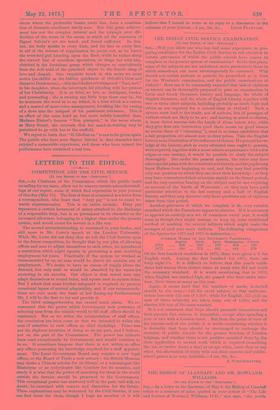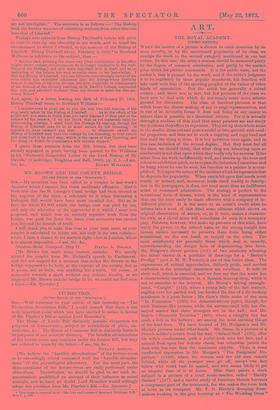THE BISHOP OF LLANDAFF AND 1)11 ROWLAND WILLIAMS.
[To THE EDITOR OF THE "SP3INATOZ.1 Sus,—In a letter to the Spectator, of May 8, the Bishop of Iiandaff refers to a sentence of mine, quoted in your review of "The Life and Letters of Rowland Williams, D.D.," and says, "the words
are not intelligible." The sentence is as follows :—" The Bishop took the further measure of admitting students from other dioceses into that of Llandaff."
Perhaps two extracts from Bishop Thirlwall's letters will serve at once to clear up any obscurity in my words, and to recall the circumstance to which I alluded, to the memory of the Bishop of Llandaff. Bishop Thirlwall wrote, February 2, 1856,*to Rowland Williams in reference to the subject, thus :—
" Another fact, pointing the same way [that continuance in his office might, under certain circumstances, be no longer conducive to the well- being of the College] and still more important both in itself, and as an indication of the future, has very recently come to my knowledge. I find the Bishop of Llandaff, who has hitherto most strongly enforced the rule which has restricted admission into the Abergavenny Divinity School to natives of his own diocese, has now, expressly in consequence of his distrust of the divinity teaching at St. David's College, suspended this rule, and admitted students from my diocese to enter the Aberga- venny School."
And again, in a letter bearing the date of. February 27, 1856, Bishop Thirlwall wrote to Rowland Williams :— I endeavoured to point out to you the real two-fold bearing of the step lately taken by the Bishop of Llandaff. . . . As to the effect of his public acts you seem to think that you have disposed of that part of the subject by the remark, 'I do not think that as yet materials exist for pronouncing whether I shall hurt the College by staying, though the Bishop of Llandaff may do so to some extent by his licensing.' It appears to have escaped you that to whatever extent the Bishop of Llandaff may hurt the college by his licensing, to that extent you must hurt it by your stay, which is the cause of that licensing, and the thing on which its continuance will entirely depend."
I quote these extracts from the MS. letters, but they have already appeared in print, having been quoted by Dr. Williams in his "Earnestly Respectful Letter to the Lord Bishop of St. Davide," (Cambridge : Deighton and Bell, 1860), pp. 2, 5.—I am,



































 Previous page
Previous page